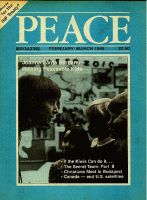
Peace Magazine Feb-Mar 1988, page 19. Some rights reserved.
Search for other articles by Jillian Skeet here
I once believed that Canada was a strong promoter of nuclear disarmament, an innocent victim of superpower politics.
My ignorance was painfully discarded when I left Canada for the reality of international disarmament negotiations in Geneva and New York. Working at the United Nations as the Intern on Disarmament for the Women's International League for Peace and Freedom, I monitored the 1986 session of the Conference on Disarmament and the Forty-First United Nations General Assembly (UNGA). One year was long enough to glimpse the truth behind the veil. As my illusions were shattered I fought to deny the truth about the role that my country was playing in disarmament.
The Conference on Disarmament (C.D.), which meets in Geneva, is the only multilateral disarmament "negotiating" body in the world. Canada is one of forty permanent members that meet yearly from February through August.
The first statement Canada made during the 1986 session of the Conference did not address many of the urgent issues on the agenda. There was one diluted statement about placing priority upon a test ban treaty and a lot about verification, but almost nothing about nuclear disarmament or other critical issues on the agenda. I had no idea yet that in coming months, I would repeatedly hear versions of that speech on verification.
The months passed and negotiations at the Conference were soon deadlocked on every nuclear issue. Although I was increasingly disturbed by Canada's membership in the Western bloc of nations, responsible for the deadlock on almost every issue, I remained convinced that we did not really support these obstructive positions. I thought our dissent was hidden by bloc posturing and by the rule of consensus which gives every state the power of veto. However, I could not explain the fact that our dissent was never registered. I labeled Canada's role as one of "silent complicity," but this quickly changed when I arrived in New York to follow the deliberations in the United Nations.
Unlike the Conference on Disarmament, where nations can easily side-step contentious issues, U.N. Member States must formally register their positions by voting on resolutions on very specific issues in the United Nations General Assembly.
Here, I ran out of excuses for my country. The silence which I had seen earlier as Canadian reluctance to break the unity of the Western bloc was, in fact, agreement with these positions.
In the General Assembly, the Canadian position:
By voting against and abstaining on more disarmament resolutions than it supported, it was clear that Canada backed the NATO/ Western position on most nuclear issues.
In international disarmament talks Canada places major emphasis on seeking methods of verifying arms control and disarmament agreements. While verification is an important part of negotiating, it is just one element in the process. Verification is meaningless if there is nothing to verify, yet Canada pressures for verification, instead of arms control negotiation.
Given the history of verification-as-stalling-tactic in disarmament negotiations, we have a right to ask such questions. For years the U.S. argued that inadequate means of verification made disarmament agreements (e.g. a comprehensive test ban) impossible. When technical advances eliminated the credibility of this argument, a new obstacle was erected: "compliance."
Canada often argues that adequate verification will remove the obstacle that keeps states from entering negotiations. Experience with the U.S. position on a Comprehensive Test Ban Treaty suggests it is a lack of political will, not inadequate verification measures, that prevents a CTBT.
Each year Canada drafts a resolution on verification, and the United States drafts the sole resolution on compliance. The Canadian and American resolutions are categorized together by the U.N. as "Verification and Compliance."
We drafted a resolution on the Prohibition of Production of Fissionable Material for Weapons Purposes but, even as a sponsor of this resolution, we do not give it real support. In fact, we still export weapons-grade uranium to the U.S., claiming that it is "for peaceful purposes only." (Norm Rubin of Energy Probe says that the world sees Canadian uranium as "the lifeblood of the arms race." Even if our uranium were earmarked when it crossed the U.S. border, we are making weapons development easier by releasing other sources of uranium for that purpose.)
anada also supports resolutions relating to conventional disarmament-- including the reduction of military budgets. But, given the defence policy outlined in the government's White Paper, one questions the commitment to these measures.
All in all, it is a dismal record. Ironically, in debates over Canada's membership in NATO, the government argues that: "If we withdraw from the Alliance, we will lose our influence in arms control and disarmament negotiations."
The Government wants us to believe that Canada is truly a peacemaker and it knows many Canadians-- such as I-- desperately want to believe it. Our task, then, is to be informed and to send a clear message to the government that, in a world confronting the spectre of nuclear annihilation, verification is not enough. We want our country to promote disarmament practically and politically. Such a policy would envisage a new role for Canada truly as an international peacemaker.
Jillian Skeet is the Executive Secretary of the Group of 78

Peace Magazine Feb-Mar 1988, page 19. Some rights reserved.
Search for other articles by Jillian Skeet here